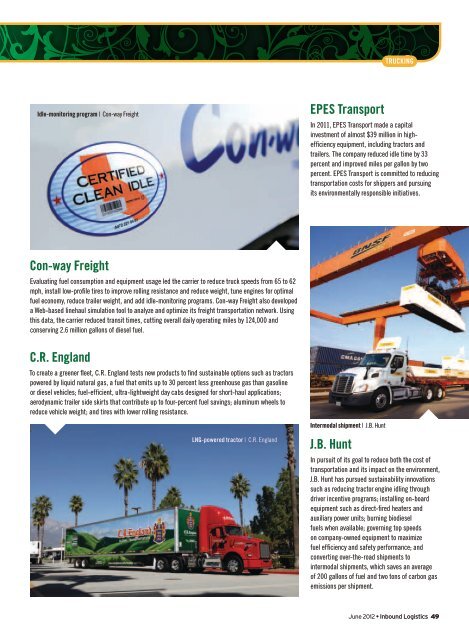75 GREEN SUPPLY CHAIN PARTNERS
75 GREEN SUPPLY CHAIN PARTNERS
75 GREEN SUPPLY CHAIN PARTNERS
Create successful ePaper yourself
Turn your PDF publications into a flip-book with our unique Google optimized e-Paper software.
Idle-monitoring program | Con-way Freight<br />
Con-way Freight<br />
Evaluating fuel consumption and equipment usage led the carrier to reduce truck speeds from 65 to 62<br />
mph, install low-profi le tires to improve rolling resistance and reduce weight, tune engines for optimal<br />
fuel economy, reduce trailer weight, and add idle-monitoring programs. Con-way Freight also developed<br />
a Web-based linehaul simulation tool to analyze and optimize its freight transportation network. Using<br />
this data, the carrier reduced transit times, cutting overall daily operating miles by 124,000 and<br />
conserving 2.6 million gallons of diesel fuel.<br />
C.R. England<br />
To create a greener fl eet, C.R. England tests new products to fi nd sustainable options such as tractors<br />
powered by liquid natural gas, a fuel that emits up to 30 percent less greenhouse gas than gasoline<br />
or diesel vehicles; fuel-effi cient, ultra-lightweight day cabs designed for short-haul applications;<br />
aerodynamic trailer side skirts that contribute up to four-percent fuel savings; aluminum wheels to<br />
reduce vehicle weight; and tires with lower rolling resistance.<br />
LNG-powered tractor | C.R. England<br />
EPES Transport<br />
Intermodal shipment | J.B. Hunt<br />
J.B. Hunt<br />
TRUCKING<br />
In 2011, EPES Transport made a capital<br />
investment of almost $39 million in higheffi<br />
ciency equipment, including tractors and<br />
trailers. The company reduced idle time by 33<br />
percent and improved miles per gallon by two<br />
percent. EPES Transport is committed to reducing<br />
transportation costs for shippers and pursuing<br />
its environmentally responsible initiatives.<br />
In pursuit of its goal to reduce both the cost of<br />
transportation and its impact on the environment,<br />
J.B. Hunt has pursued sustainability innovations<br />
such as reducing tractor engine idling through<br />
driver incentive programs; installing on-board<br />
equipment such as direct-fi red heaters and<br />
auxiliary power units; burning biodiesel<br />
fuels when available; governing top speeds<br />
on company-owned equipment to maximize<br />
fuel effi ciency and safety performance; and<br />
converting over-the-road shipments to<br />
intermodal shipments, which saves an average<br />
of 200 gallons of fuel and two tons of carbon gas<br />
emissions per shipment.<br />
June 2012 • Inbound Logistics 49


